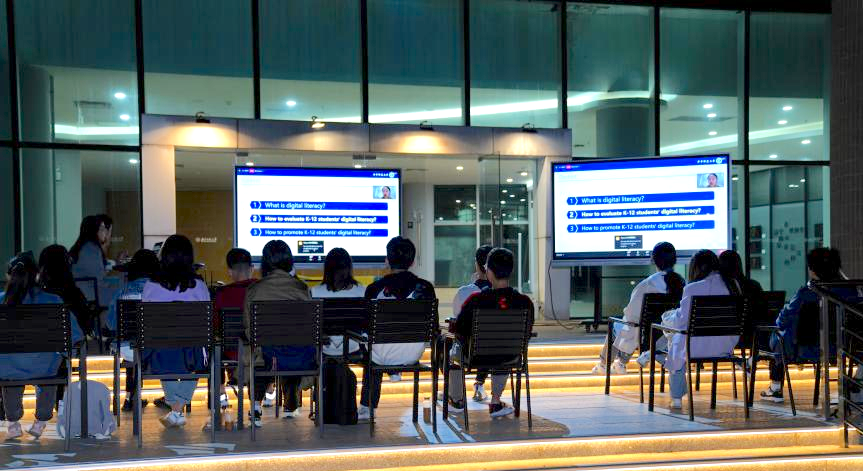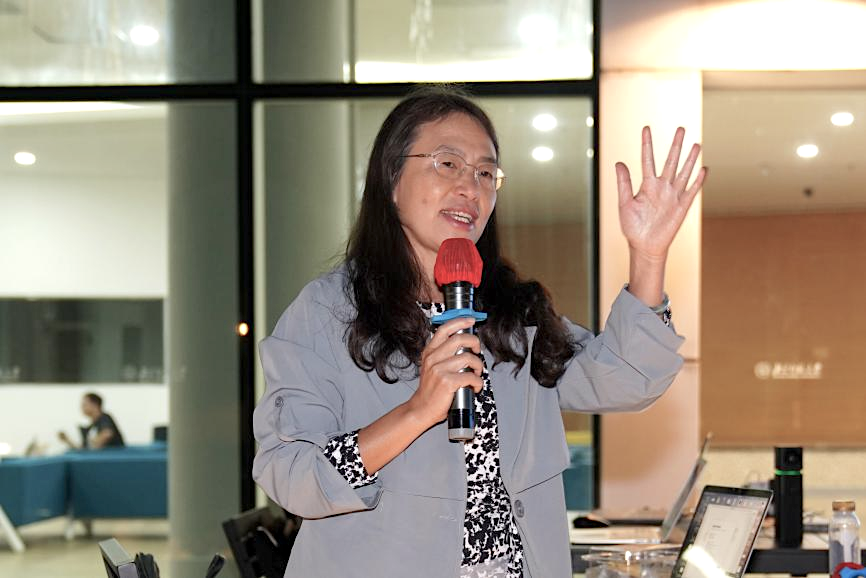On the evening of November 15th, the Future Education Institute of Beijing Normal University and the Future Digital Education Institute of Cambridge University jointly hosted the third International Salon on Future Education. The event invited Dr. Zhu Sha from the School of Artificial Intelligence Education at Central China Normal University, Dr. Laura Kerslake from the Faculty of Education at Cambridge University, and Director Lloyd Jeeves from the Cambridge Assessment Center as keynote speakers, focusing on the topic of "Digital Skills and Literacy - New Teacher Competence Development" for lectures and discussions. Professor Yuan Li from the Future Education Institute hosted the event, and more than 100 teachers and students from the Zhuhai campus participated in the event at the lakeside platform outside Building A101, along with over 200 online listeners.

Professor Yuan Li introduced the important role of digital literacy in today's society and explained how it influences education in her speech. Professor Yuan Li mentioned that the "Action Plan for Enhancing National Digital Literacy and Skills" issued by the Central Network Security and Informatization Committee pointed out that by 2025, China's digital adaptability, competency, and creativity will be significantly improved, and the development environment for digital literacy and skills will also be significantly optimized, forming a basic supply capability of digital resources that are rich in channels, open for sharing, and of high quality and universality.

Dr. Zhu Sha from Central China Normal University presented her research on digital literacy in her speech. She stated that with the development of technology, the importance of digital literacy will be further strengthened. The assessment of personal digital literacy includes four aspects: sensitivity to knowledge, mastery of information theory, methods, principles, and information technology, ability to use information technology to solve learning and life problems, and awareness and understanding of ethical principles in information activities. Dr. Zhu Sha's team reached three conclusions through a series of empirical studies. Firstly, there is a correlation between students' ability to use communication technology and their digital literacy. Secondly, parents and teachers' ability and interest in using communication technology influence students' digital literacy. Thirdly, students in highly informationized areas perform significantly better in digital literacy tests than those in low informationized areas. Dr. Zhu Sha believes that schools should organize lectures to improve parents' ability to use information and communication technology, create more communication opportunities for teachers and parents, and provide training for parents to help them understand information and communication technology knowledge and skills.

Director Lloyd Jeeves gave a speech on the Cambridge Primary and Secondary Digital Literacy Curriculum. He stated that digital literacy needs to be oriented towards the three dimensions of tool and content creation, safety and health, and the digital world. Students need to be able to identify and interact with items on the screen, understand the importance of passwords, and understand the changes that computers can bring to the world. In addition, due to the impact of the pandemic, there may be subjects that cultivate digital literacy and information processing abilities.
Dr. Laura Kerslake used the Inquiring Science project as an entry point to explain how to guide children to identify the authenticity of information in the digital world. She emphasized that children still have difficulty distinguishing facts from public opinions in the digital world, so innovative technologies are needed to teach students to think scientifically.
During the interactive Q&A session, the audience asked questions enthusiastically in written form, and the three speakers patiently answered and had in-depth exchanges with the audience. Online listener Heidi asked how to shape a digital classroom in the context of the pandemic. Director Jeeves stated that the pandemic has brought great challenges to teaching, but also brought new opportunities, such as students using digital technology products for online collaborative learning. Dr. Zhu Sha stated that a digital classroom can provide students with timely feedback, and teachers can use this data to provide personalized teaching services.

The salon event ended successfully in a heated discussion.



 Last Page
Last Page

 Phone:0756-3621121
Phone:0756-3621121
 Email:ccie@bnu.edu.cn
Email:ccie@bnu.edu.cn